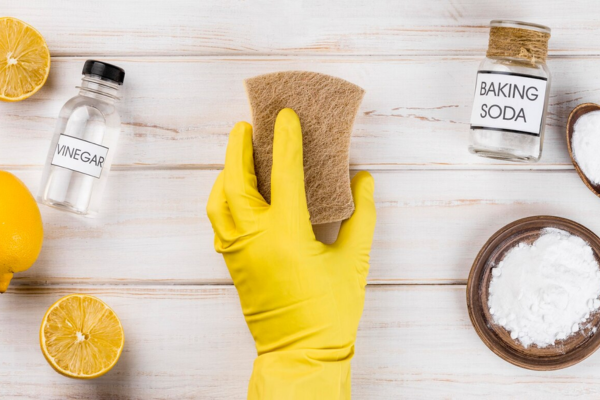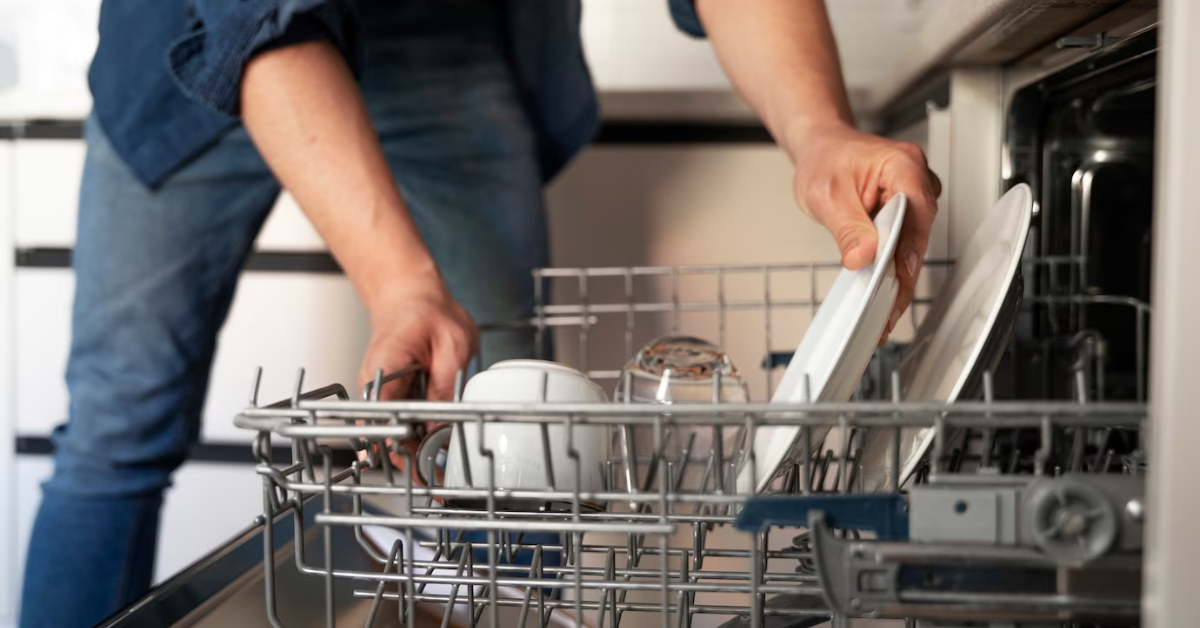How to Get Rid of Dishwasher Smell: A Complete DIY Guide
TL;DR / Quick Summary
- Fastest Solution: Run a vinegar and baking soda cycle (separately) to quickly eliminate dishwasher odors.
- Best Deep Clean: Manually clean the filter, spray arms, and door seals, then follow with a baking soda paste for a thorough refresh.
- Eco-Friendly DIY Deodorizer: Use citrus peels soaked in vinegar for a natural deodorizing solution.
- Prevention Tips: Routine monthly maintenance will help prevent bad odors from developing in your dishwasher.
Introduction

A smelly dishwasher can be an unexpected frustration—an appliance designed to clean shouldn’t create odors, right? Unfortunately, even with regular cycles, dishwashers can accumulate food particles, soap scum, and grease, leading to lingering odors in your kitchen. This guide provides expert tips to deodorize, deep clean, and maintain a fresh-smelling dishwasher.
Understanding Dishwasher Odors
Common Causes of Smelly Dishwashers
Dishwasher odors usually stem from a few main causes:
- Dirty or Clogged Filter: Food particles can build up in manual filters, while self-cleaning filters (also called hard-food disposers) may need occasional checking for blockages.
- Food Residue on Interior Walls and Components: Bits of food may cling to walls, spray arms, and the door lip, leading to odors.
- Mold or Mildew Growth on Gasket Seals: The crevices around gasket seals are prone to mildew, especially if not regularly cleaned.
- Clogged Drain: A blocked drain can cause stagnant water to accumulate, exacerbating the odor.
Note: If you’re unsure about your filter type, check your dishwasher’s manual (or look up the model online) to see whether it’s self-cleaning or manual. Each type may have different cleaning requirements.
Step-by-Step Guide to Deodorizing a Smelly Dishwasher
Supplies Needed
- White vinegar
- Baking soda
- Dish soap
- Sponge
- Soft-bristled brush or old toothbrush
- Clean, dry towel
- Dishwasher-safe bowl
Important Safety Note
When using vinegar as a cleaner, do not combine it with bleach or any detergent containing chlorine, as this creates dangerous chlorine gas. Always check your dishwasher detergent’s ingredients before cleaning with vinegar.
Step-by-Step Deodorizing Guide
Step 1: Empty the Dishwasher
Remove all dishes, glassware, and utensils to ensure complete access to the dishwasher’s interior.
Step 2: Clean the Drain Filter
If your dishwasher has a manual filter, it’s essential to clean it monthly to avoid odor buildup.
- Remove the bottom dish rack and locate the filter (usually at the bottom back of the dishwasher).
- Take out the cylindrical or flat filter according to your model’s instructions. This is often quite simple but makes a big difference.
- Soak the filter in warm, soapy water, and use a soft-bristled brush to scrub away food particles and grease.
- Rinse thoroughly and wipe any debris around the drain before reinserting the filter, making sure it locks in place.
Tip: Self-cleaning filters (hard-food disposers) generally don’t need regular cleaning, but they can occasionally develop clogs. If you suspect a blockage, consult your manual for guidance.
Step 3: Clean the Spray Arms
Blocked spray arm ports can trap food particles and restrict water flow, impacting cleaning performance and causing odors.
- Remove the spray arms (usually the lower and upper arms) by following your dishwasher’s manual.
- Rinse the spray arms in warm, soapy water. Use a toothpick or tweezers to clear any debris from the small water jet holes.
- Reinstall the spray arms once clean.
Step 4: Wipe Down the Door Lip and Gasket Seals
Food and grime can accumulate around the door lip and gasket seals, leading to mold and odors.
- Open the dishwasher door and inspect the bottom lip and door seals.
- Wipe these areas with a damp microfiber cloth or soapy sponge to remove any buildup.
- Dry with a clean towel to prevent moisture buildup, which can lead to mold growth.
Pro Tip: Regularly wiping down the door lip and seals can help prevent mold from taking root, keeping your dishwasher fresher for longer.
Step 5: Neutralize Stubborn Odors with Vinegar and Baking Soda
Even after cleaning, some stubborn smells may linger. These steps help tackle persistent odors without the “volcano effect” of combining vinegar and baking soda.
- Fill a dishwasher-safe bowl with 1 cup of white vinegar and place it on the top rack.
- Run a high-heat cycle without detergent. The vinegar will neutralize smells and help remove mineral deposits.
- Once the cycle is complete, sprinkle 1 cup of baking soda on the bottom basin.
- Run another high-heat cycle—again without detergent—to eliminate any remaining odors.
DIY Dishwasher Deodorizer Recipes

- Vinegar and Citrus Peel Freshener: Soak citrus peels in vinegar for a few days. Then, pour the mixture into the dishwasher and run a rinse cycle.
- Essential Oil Deodorizer: Add a few drops of lemon or tea tree oil to a cup of baking soda. Sprinkle it in the dishwasher and run a rinse cycle for a fresh, clean scent.
- Baking Soda Paste: Apply a baking soda paste to problem areas like the door seal for stubborn odors; let it sit for a while before wiping it clean.
How Often to Clean Key Components
Suggested Schedule for Ongoing Freshness:
- Filter: Clean monthly if it’s manual; check occasionally if it’s self-cleaning.
- Spray Arms: Clean every two to three months to prevent buildup.
- Door Lip and Gasket Seals: Wipe down monthly, especially if you use your dishwasher daily.
- Vinegar and Baking Soda Rinse: Run this rinse cycle every month for consistent freshness.
Preventing Future Bad Smells in a Dishwasher
Routine maintenance is essential for avoiding dishwasher odors. Here’s how:
- Monthly Filter Cleaning: Rinse the filter to remove food particles before they accumulate.
- Avoid Overloading: Ensure dishes are loaded so water and detergent can reach every surface.
- Monthly Deodorizing Rinse: Run a vinegar or baking soda rinse monthly for ongoing freshness.
- Check Detergent Ingredients: Make sure your detergent doesn’t contain chlorine if you’re using vinegar to clean.
Troubleshooting for Persistent Dishwasher Smells
If smells persist, it may indicate deeper issues:
- Check Water Temperature: Ensure the dishwasher’s water is hot enough for effective cleaning. Cooler temperatures may leave residues.
- Hard Water Solutions: Consider using a water softener or a hard water-specific dishwasher cleaner to reduce mineral buildup.
- Inspect Drain Line: If odors linger, check the drain line for blockages. Persistent smells may require a professional technician for diagnosis and repair.
FAQ
- What’s the best way to clean a smelly dishwasher? Start with a basic vinegar and baking soda cycle, followed by a deep clean of the filter, spray arms, and seals.
- How can I prevent bad smells in my dishwasher? Regular maintenance—like monthly filter cleaning and a vinegar rinse—can help prevent odor buildup.
- How often should I deodorize my dishwasher? A light weekly cleaning and a monthly deep clean are ideal for keeping it odor-free.
Conclusion
While dishwasher odors can be persistent, a straightforward cleaning routine can keep your dishwasher fresh and odor-free. With regular maintenance, you’ll prevent lingering smells and extend your dishwasher’s lifespan.



